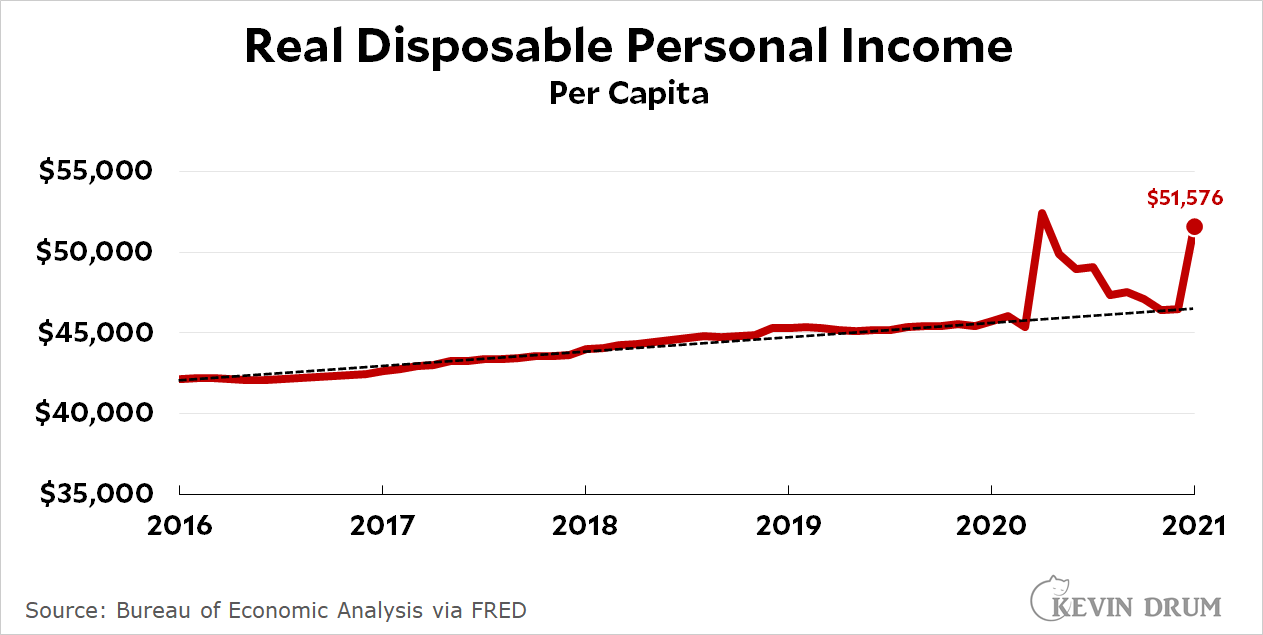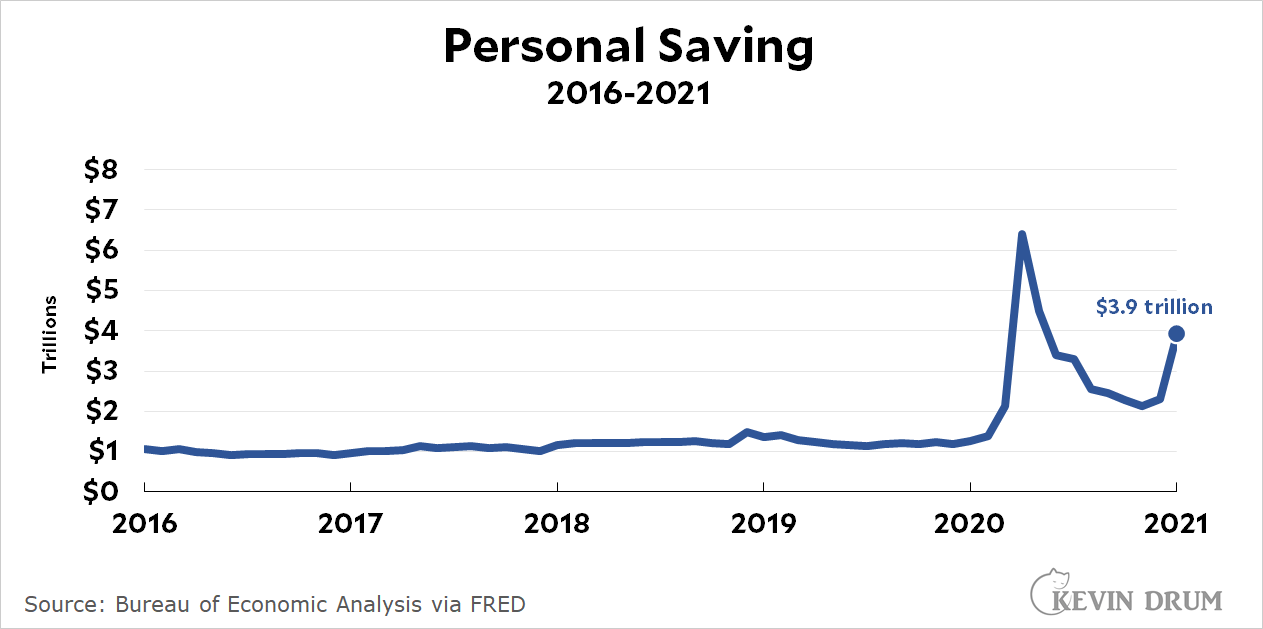It's remarkable what a little stimulus can do:

Disposable income rose nearly 11% in January thanks to the coronavirus bill passed in December. If we pass an even bigger one this month, personal income should soar.
By the way, this chart also shows how stimulus checks play out over time. The first checks in April pushed income way up, followed by a steady decline as payments faded. The same thing is likely to happen with both the December and March checks (assuming the current stimulus bill passes). This means that by this summer, when vaccinations will be widespread and the economy can fully reopen, personal income will have been kept high enough to prevent any serious effects on the macro economy. Put that together with the effect of the stimulus bills on the personal saving rate . . .

. . . and there's every reason to think we'll enter autumn with everything in place to get the economy thriving once again.

That ‘nearly 11%’ has to be an annualized figure, right? So it means nothing, because Congress isn’t going to send out $600 checks every month.
Well, OK, for the median personal income of ~$36,000, it means about a 1.7% increase for the year. If the $1400 payment passes, that brings the total up to 5.5% for the year. Significant, but percentage-wise, the $400/week Federal add-on to UI is a bigger deal for the recipients.
When totaled over the months there are still what look like significant increases in income for the last two packages. But the fact is that neither produced recovery - we are still way below trend or potential GDP. There is no reason to believe that the new stimulus, even if it is bigger (this remains to be seen - it hasn't passed yet) would itself bring things back to trend, let alone cause "overheating". What will be more important is getting past the covid restrictions, so that the economy can develop normally. When totaled, the increases in savings don't actually amount to much for a person who might have to repay a year's rent.
The effects of fiscal stimulus are probably greatly overestimated. The Japanese spent huge amounts on infrastructure and other things after their 1991 crash, running up debt/GDP of over 230%, and this did not produce a boom or any excess inflation (there was even deflation). Of course the debt has not destroyed the Japanese economy either. Again, just because economists can crank out a numerical predictive model doesn't mean it has any meaning. There are too many unknown quantities in such calculations. In fact they are usually wrong.
Well, in the blue states we’re not really trying to recover yet, we’re just trying to tread water until the risks of COVID-19 transmission are down to a reasonable level. I think recovery will be gradual, in some sectors very gradual. My wife and I enjoy classical-music concerts and the occasional opera; the audiences skew older, and I think will be cautious about returning. A lot of restaurants and other businesses that had a lot of trade from office workers will be challenged if working from home remains at a higher level. Not to mention the impact on commercial real estate.
My wife is poised for takeoff. She just bought a Cessna 172. She learned to fly as a young woman. Then life got in the way. I encouraged her to renew her license. We are both in the last of our "good" years. Me 85 and her 75. Do it now or never do it.
Cool. My wife's father, who's gone now, was a pilot and loved to fly. For those who have that yearning, one of life's great thrills.
. . . and there's every reason to think we'll enter autumn with everything in place to get the economy thriving once again.
That doesn't mean returning to a pre-pandemic economy. It means returning to the kind of economy we haven't seen this century.
I don’t care if the ‘economy’ ‘thrives’. I don’t think all the jobs are going to come back promptly, so Congress should extend the Federal UI boost, and start some of that green-economy work, and the infrastructure improvement we’ve been putting off. I’d like to see the minimum wage raised, and healthcare coverage expanded, so that we emerge with fewer people in poverty, instead of more.
CHRISTMAS!!!! Too the moon Alice!!!
I am curious how many individuals are deferring rent/mortgage payments.
Calculated Risk, Bill McBride, posts that frequently.
Residential landlords generally report collections within a few percentage points of usual. It hasn't been the crisis some had feared. I haven't seen statistics on home mortgages. Commercial mortgages in the hospitality and retail sectors show a lot of distress; other sectors not so much.
Poise is good.
I think you're overly optimistic.
In this bifurcated economy, the savings and disposable income rates you're charting is predominantly reflective of upper-income groups -- all that stuff about how the top X% earn 90%+ of all income, etc.
Instead, show the middle and lowest quintiles.
This is a contrarian take, but Wolf Richter posits that the stimulus has largely already been spent (this is before the latest COVID bill which might include an additional $1400/per and improved UI benefits).
https://wolfstreet.com/2021/02/26/just-dont-expect-pent-up-demand-from-consumers-heres-why/
And here's the link to the mortgage delinquency rate from Calculated Risk:
https://www.calculatedriskblog.com/2021/02/fannie-mae-mortgage-serious-delinquency.html
If consumers have been on a capital goods buying spree while delaying mortgage/rent obligations, that would seem to have a chilling effect once the stimulus is pulled and the moratoriums end.
I prefer Kevin's more optimistic view, but....